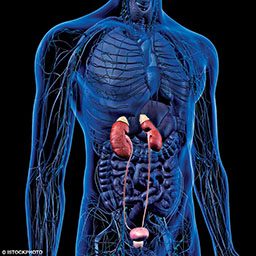I want to donate a kidney to my sister, who is in need. Will donating a kidney affect my ability to dive?
First, thank you for considering being a living kidney donor. The U.S. Department of Health and Human Services reports that more than 114,000 people in the United States are awaiting a lifesaving organ transplant, and someone is added to the waiting list every 10 minutes. About 83 percent of these people are awaiting a kidney, but there simply aren’t enough donors — living or deceased — available to meet the demand. Your gift of life is heroic and much needed.

The concern with diving after donating a kidney is the same as with any abdominal surgery: You must allow a sufficient amount of time for healing not only the external surgical site but also the abdominal wall and the organ structures. For this reason, you’ll likely stay in the hospital for several days. Once discharged you’ll continue your recovery at home. It generally takes about six weeks for you to heal completely and return to your normal routine. If you have no complications in healing, you can consider diving after your surgeon clears you for unrestricted physical activity.
A common symptom following kidney donation is persistent fatigue, which can vary in duration. If you experience significant fatigue, diving is not recommended. Once your fatigue subsides, diving should not present any increased risk. There is no evidence of increased or decreased DCS risk following kidney donation or abdominal surgery. Once your physician clears you to dive, your risks will be no greater than they were before the surgery.
For more information about recovery from kidney donation, visit unos.org/donation/living-donation.
— Jonathan Gilliam, EMT-P, DMT
I have been a dive instructor for more than 20 years. Last year I was diagnosed with hypertrophic cardiomyopathy; I do not take any medication for my condition, and I have passed several tests, including a full stress test last February. About a month ago I met with my cardiologist to discuss my fitness to dive. My physician is pleased with my stress test results, and he reviewed my Recreational Scuba Training Council (RSTC) Medical Statement. After my exam he recommended that I exercise but avoid training that would increase my heart rate to more than 160 beats per minute for prolonged periods. He did not say that I couldn’t dive, but he said there is potential for increased risk if something happens to me while underwater. What is your professional medical opinion on this condition? Can I still dive?
A hypertrophic cardiomyopathy is not necessarily an absolute contraindication to scuba dive; it depends on how well your heart can perform under the physical demands typically encountered on the type of diving you expect to be able to accomplish.
First, you should define what type of diving you expect to be able to do, where you plan to dive and what you expect from diving.
- Type of diving: The demands of a predictable and shallow tropical reef dive are not the same as those of a dive to the Andrea Doria. Thermal stress, dealing with currents, breathing dense gases, psychological stress and heavy equipment could significantly influence your cardiovascular demands.
- Location: The location of your dive directly correlates to the amount and severity of risks you are taking if anything goes wrong. There is a big difference between diving 30 minutes off the coast of Miami, Florida, where you have access to world-class medical facilities and readily available emergency medical services (EMS) and diving off Vanuatu, where you are far from the closest reliable medical facilities in New Zealand or Australia.
- Dive expectations: If you are acting as a dive instructor, your demands are higher than those of a diver who is simply enjoying a dive with a buddy. While diving for enjoyment, divers are responsible for their own well-being and at most the well-being of a dive buddy. As an instructor, you are responsible for all the divers following your lead, and you must be physically ready to make a rescue at any time to fulfill the duty of care you have to your students. Consider these requirements before you take on students, and assess your abilities with your doctor to determine if you are able to meet the demands of being a dive professional or whether you should stick to diving for enjoyment.
We cannot weigh in on your medical and physical fitness to dive with such little information. While your cardiologist was pleased with your stress test results, that news could be deceptive: The doctor might have expected lower outcomes, and your results still might not indicate that you are fit enough to dive. Scuba diving poses some unique cardiovascular challenges that cannot be accurately replicated in any other context. Even the best cardiovascular assessment will not simulate the blood shifts that occur when you are immersed or the increased breathing resistance that takes place when you are breathing colder, drier and denser gas from a scuba regulator.
See the following links for more information about scuba diving and the heart:
Your doctor can call our Medical Information Line at 919-684-2948 with any questions or concerns when assessing your physical and medical fitness to dive. If your doctor is not comfortable making this recommendation, we can refer you to a physician near you who has knowledge and experience in dive medicine.
— Matías Nochetto, M.D.
I am a dive instructor living in Denmark, and I travel to the United Kingdom four or five times a year either by car or on the Eurotunnel Le Shuttle to cross the English Channel. The Channel Tunnel lies 246 feet (75 meters) below sea level, and you can clearly feel your ears popping as you ride through. Does this exposure to increased pressure affect me if I want to dive immediately before or after riding the shuttle, even if I am doing repetitive dives?

The pressure in the Channel Tunnel (Chunnel), which is open to the atmosphere on both ends, without any train traveling through it would be the same as the ambient atmospheric pressure plus the additional weight of a 131-foot (40-meter) vertical column of air, which is negligible. When a train is running through the tunnel, however, the air in front of the train is pushed and increases pressure, while the air behind the train is rarefied and causes decreased pressure. This effect creates additional pressure above the car equal to 20 kPa (kilopascals) — the same amount of pressure a 6.5-foot (2-meter) column of water exerts, which would be unpleasant to passengers in the car. To alleviate this pressure, engineers created a sophisticated system of overpressure valves that keep the pressure difference down to 6 kPa (2 fsw, 0.6 msw).
This constitutes all the additional pressure that passengers are exposed to during the ride and does not affect the decompression safety of divers.
— Petar Denoble, M.D., D.Sc.
© Alert Diver — Q1 2019